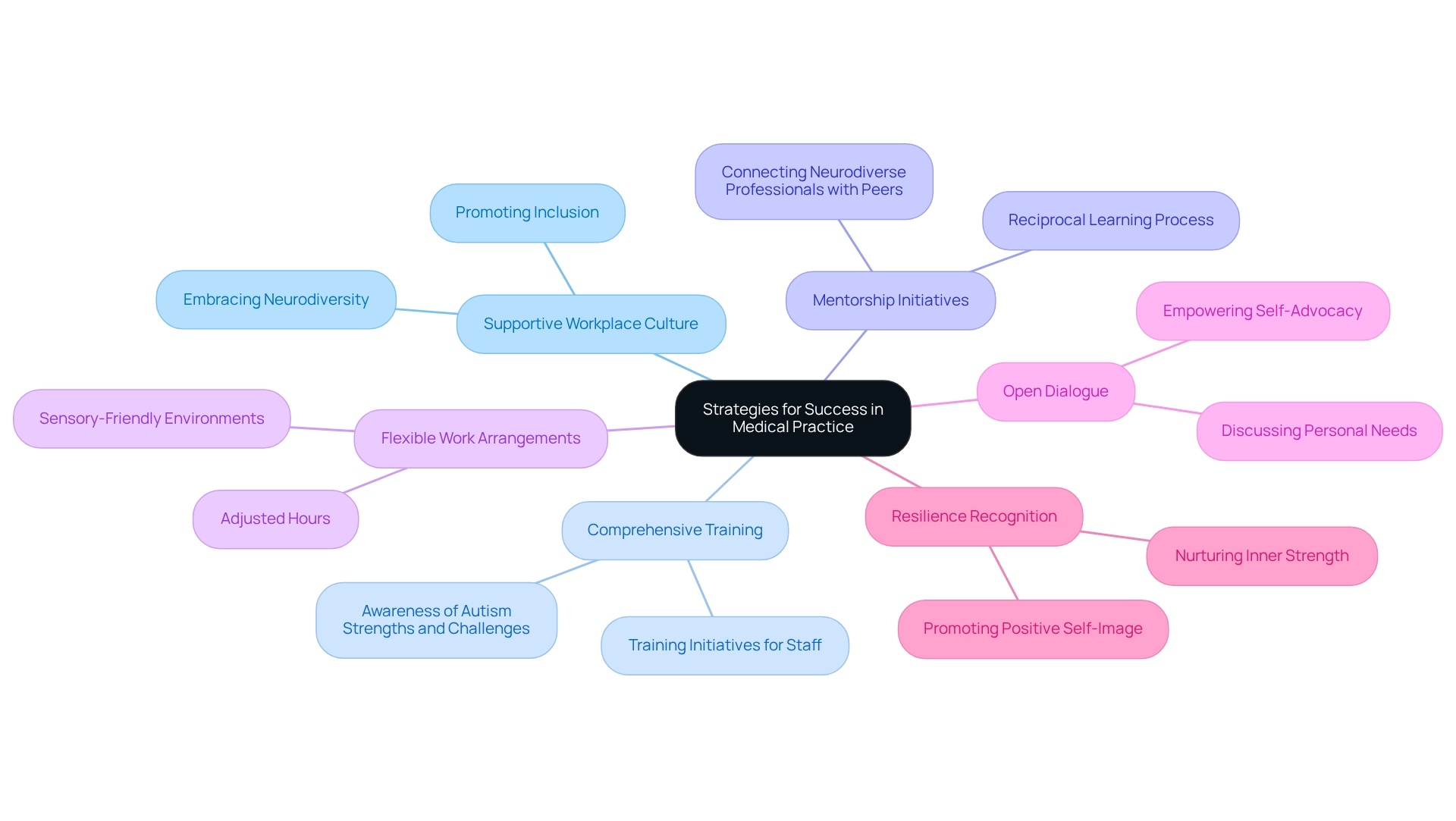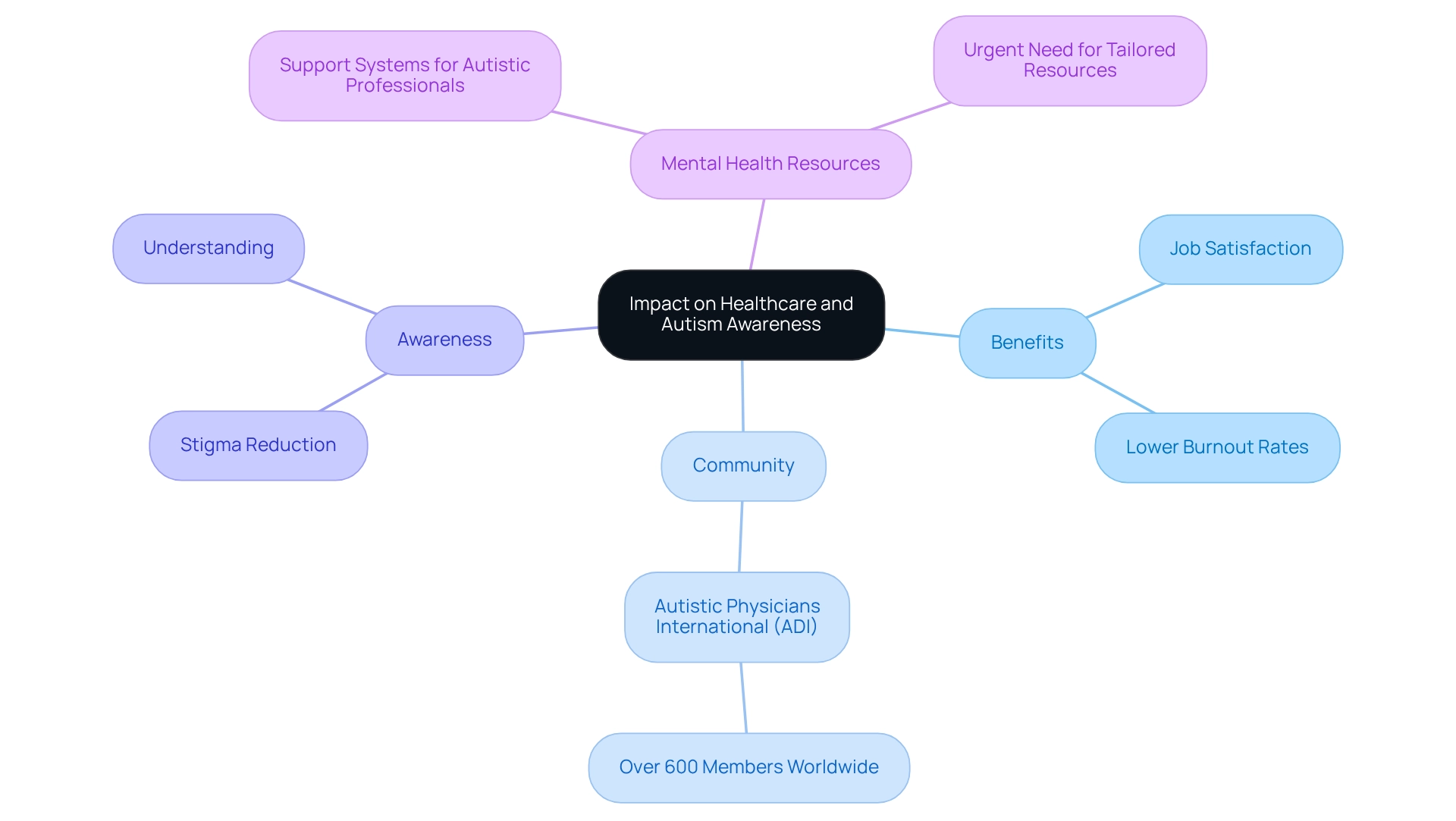Overview
This article sheds light on the significant challenges that autistic doctors face within the healthcare system, underscoring the crucial need for supportive environments that enable them to thrive. These dedicated medical professionals often encounter stigma and communication barriers, which can hinder their ability to provide the best care possible. By implementing effective strategies such as mentorship, flexible work arrangements, and awareness training, we can enhance their job satisfaction and improve patient care. This not only benefits the individuals involved but also enriches the healthcare system as a whole.
Imagine a workplace where every doctor, regardless of their background, feels valued and understood. Through mentorship programs, autistic doctors can find guidance and support from experienced colleagues, paving the way for a more inclusive environment. Flexible work arrangements can accommodate their unique needs, allowing them to perform at their best. Moreover, awareness training for all staff can foster a culture of understanding, breaking down the barriers that often isolate these professionals.
Together, we can create a healthcare environment that not only acknowledges the challenges faced by autistic doctors but actively works to alleviate them. It’s time to take action—let’s advocate for these necessary changes and support our healthcare professionals in their journey.
Introduction
The landscape of healthcare is experiencing a profound transformation as autistic doctors increasingly carve out their place within the profession. This shift not only challenges long-standing misconceptions about autism but also shines a light on the unique strengths that neurodiverse individuals contribute to the medical field, such as meticulous attention to detail and innovative problem-solving skills.
However, despite these advantages, autistic professionals often encounter significant hurdles, including:
- Stigma
- Communication barriers
- The challenging decision of whether to disclose their diagnosis
As the healthcare system begins to acknowledge the value of neurodiversity, it becomes essential to explore the challenges these doctors face and the strategies that can cultivate a more inclusive environment. By addressing these issues, the medical community can enhance both the well-being of autistic professionals and the quality of care they provide to patients.
Background: Autistic Doctors in Healthcare
The growing presence of neurodivergent medical professionals in healthcare signals a vital shift towards embracing diverse neurological conditions within professional environments. Historically, autism has often been mischaracterized, leading to stigmatization and exclusion from fields such as medicine. Yet, contemporary research highlights that individuals on the autism spectrum contribute unique strengths, such as exceptional attention to detail and innovative problem-solving abilities, which can significantly enhance medical practice. For example, a recent survey revealed that 48.8% of respondents identified paid time off or mental health days as essential accommodations, underscoring the necessity for supportive workplace policies.
Alludo advocates for a transformative focus from inputs to outputs when evaluating employee performance. This shift can create a more inclusive environment, especially for neurodiverse individuals. However, many neurodivergent medical professionals encounter substantial challenges, including workplace culture barriers, stigma, and the tough decision of whether to disclose their diagnosis. As Haley Moss insightfully states, "I might hit developmental and societal milestones in a different order than my peers, but I am able to accomplish these small victories on my own time." Understanding these complexities is crucial for fostering an inclusive atmosphere that recognizes the valuable contributions of autistic doctors in real life to healthcare.
Furthermore, insights from the demographics of survey respondents reveal a rich tapestry of experiences, reinforcing the call for tailored support and resources that recognize neurodiversity as an asset within the medical field. By acknowledging these realities, we can work together to cultivate a more accepting and supportive healthcare environment for all.
Challenges: Navigating the Medical Field as an Autistic Professional
Autistic doctors in real life often face a complex landscape filled with challenges that significantly impact their professional development and mental health. A widespread stigma surrounding autism leads to a hesitation among autistic doctors in real life to reveal their diagnosis, with only 32% feeling comfortable sharing this information with colleagues and patients due to concerns about negative consequences. This reluctance can exacerbate feelings of isolation and inadequacy, as many report experiencing burnout from overwhelming workloads and a lack of understanding from peers regarding their unique needs.
Communication barriers further complicate their roles, hindering effective interactions with both patients and healthcare teams. Research indicates that individuals on the autism spectrum frequently encounter misunderstandings that can lead to increased stress and diminished job satisfaction. The effect of stigma is significant, as it not only influences personal well-being but also restricts the potential contributions of autistic doctors in real life to the medical profession.
Consider the positive ripple effects of open discussions about neurodiversity. For instance, Javed's televised appearance inspired another doctor to embrace their diagnosis, highlighting the importance of fostering an inclusive atmosphere where neurodiverse voices are respected and valued. As Jim Hogan, Principal Innovation Strategist at Google, poignantly stated, "my activism is not about ending Autism, it is about ending cruelty – with a focus on the horrendous cruelty of bullying." Tackling these challenges through systemic modifications within medical settings is vital for creating a more inclusive and supportive environment for neurodivergent individuals. Together, we can advocate for change and ensure that all voices in the medical field are heard and valued.
Solutions: Strategies for Success in Medical Practice
To ensure the success of autistic doctors in real life within healthcare, it is vital to apply several effective strategies. Establishing a supportive workplace culture that embraces neurodiversity is essential. As Judy Singer, an author and activist, beautifully states, "Neurodiversity is not just a matter of social justice, it is a matter of human rights." This perspective underscores the importance of comprehensive training initiatives designed to inform personnel about autism, promoting awareness of the unique strengths and challenges faced by individuals on the spectrum.
Additionally, mentorship initiatives play a crucial role. They connect neurodiverse medical professionals with seasoned peers who can provide guidance and encouragement, aiding them in navigating the complexities of medical practice. Mentorship is a reciprocal process where both mentors and mentees learn from one another, enhancing the work environment for everyone involved.
Implementing flexible work arrangements, such as adjusted hours or sensory-friendly environments, can significantly alleviate stress and boost productivity. Furthermore, fostering open dialogue about personal needs and preferences empowers neurodivergent medical professionals to advocate for themselves. This advocacy ultimately leads to enhanced job satisfaction and improved patient care.
Amy Gravino's message on resilience highlights the inner strength of individuals who face bullying, emphasizing the importance of recognizing and nurturing this resilience in children with autism. These strategies not only support autistic doctors in real life but also enhance the medical environment as a whole. According to data from February 2012, there is a growing acknowledgment of the need for representation and assistance for medical professionals on the spectrum, further affirming the significance of these initiatives.

Results: Impact on Healthcare and Autism Awareness
The adoption of supportive strategies for neurodiverse medical professionals has led to significant benefits, enhancing both personal well-being and overall healthcare outcomes. Research shows that when neurodiverse professionals receive the necessary support, they report greater job satisfaction and lower burnout rates. This not only fosters a healthier workplace for physicians but also improves patient care, as neurodivergent medical professionals often bring unique perspectives that facilitate better communication with neurodiverse patients.
Moreover, with over 600 members worldwide, Autistic Physicians International (ADI) exemplifies the growing community of neurodiverse medical professionals making strides in the healthcare sector. The rising visibility and acceptance of autistic doctors in real life are essential for promoting awareness and understanding of autism within the medical community and society as a whole. As healthcare institutions increasingly embrace neurodiversity initiatives, the stigma surrounding autism lessens, paving the way for a more inclusive and effective healthcare system that recognizes the importance of autistic doctors in real life, which is crucial since autistic individuals often face higher rates of mental health challenges.
A recent case study highlights the urgent need for mental health resources and support systems tailored for autistic professionals in high-stress environments. As Tahleel Javed, a psychiatric doctor, poignantly stated, many individuals feel 'internally or permanently broken,' yet receiving a diagnosis can empower them with 'confidence and courage that there are possibilities.' This ongoing journey toward acceptance and understanding of neurodiversity requires a collective effort, underscoring the importance of supportive resources in the healthcare sector.

Conclusion
The increasing presence of autistic doctors in the healthcare sector represents a significant step towards embracing neurodiversity. This shift challenges outdated perceptions and highlights the unique strengths these professionals contribute to the field. However, despite their exceptional skills—such as attention to detail and innovative problem-solving—autistic doctors often encounter considerable challenges. Stigma, communication barriers, and the difficult decision to disclose their diagnosis can hinder their professional growth and overall well-being, impacting their job satisfaction.
To foster a more inclusive healthcare environment, implementing effective strategies to support autistic professionals is crucial. Establishing a supportive workplace culture, offering comprehensive training, and facilitating mentorship programs can empower autistic doctors to thrive. Additionally, creating flexible work arrangements and promoting open communication about individual needs can significantly enhance their experiences. The positive outcomes of these initiatives are clear; research indicates that supportive measures lead to increased job satisfaction and improved patient care.
As the medical community increasingly recognizes the value of neurodiversity, the growing visibility of autistic doctors plays a vital role in raising awareness and understanding of autism. This shift not only benefits autistic professionals but also enhances the healthcare system as a whole. By addressing the challenges faced by autistic doctors and implementing supportive strategies, the medical profession can cultivate a more inclusive environment that values the contributions of all individuals. This, in turn, leads to better care for diverse patient populations. The journey towards acceptance and understanding of neurodiversity requires ongoing commitment and collective effort, underscoring the importance of tailored resources and support systems within healthcare.
Frequently Asked Questions
What is the significance of neurodivergent medical professionals in healthcare?
The growing presence of neurodivergent medical professionals signals a vital shift towards embracing diverse neurological conditions, contributing unique strengths that enhance medical practice.
How has autism been historically perceived in the medical field?
Autism has often been mischaracterized, leading to stigmatization and exclusion from fields like medicine.
What strengths do individuals on the autism spectrum bring to the medical profession?
Individuals on the autism spectrum contribute exceptional attention to detail and innovative problem-solving abilities.
What accommodations do neurodivergent medical professionals find essential?
A survey revealed that 48.8% of respondents identified paid time off or mental health days as essential accommodations.
What challenges do neurodivergent medical professionals face in the workplace?
They encounter challenges such as workplace culture barriers, stigma, and the difficult decision of whether to disclose their diagnosis.
What does Haley Moss suggest about the experiences of neurodivergent individuals?
Haley Moss indicates that neurodivergent individuals may achieve developmental and societal milestones differently but can accomplish victories on their own time.
Why is it important to understand the complexities faced by neurodivergent medical professionals?
Understanding these complexities is crucial for fostering an inclusive atmosphere that recognizes the valuable contributions of autistic doctors in healthcare.
What does the survey data suggest about the need for support in the medical field?
Insights from survey respondents reveal a need for tailored support and resources that recognize neurodiversity as an asset within the medical field.
How can we cultivate a more supportive healthcare environment for neurodivergent individuals?
By acknowledging the realities faced by neurodivergent medical professionals, we can work together to create a more accepting and supportive healthcare environment for all.




